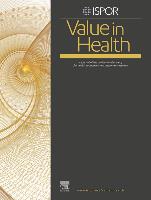Time-Driven Activity-Based Costing Supports Improved Transparency in Real-World Settings
 Lawrenceville, NJ, USA—June 17, 2020—Value in Health, the official journal of ISPOR—the professional society for health economics and outcomes research, announced today the publication of results of a study suggesting that time-driven activity-based costing can be an effective technique to support value-based healthcare initiatives. The report, “Advances in Value-Based Healthcare by the Application of Time-Driven Activity-Based Costing for Inpatient Management: A Systematic Review,” was published in the June 2020 issue of Value in Health.
Lawrenceville, NJ, USA—June 17, 2020—Value in Health, the official journal of ISPOR—the professional society for health economics and outcomes research, announced today the publication of results of a study suggesting that time-driven activity-based costing can be an effective technique to support value-based healthcare initiatives. The report, “Advances in Value-Based Healthcare by the Application of Time-Driven Activity-Based Costing for Inpatient Management: A Systematic Review,” was published in the June 2020 issue of Value in Health.
This study was developed in collaboration with the Brazilian Health Institute for Technology Assessment, coordinated by Carisi A. Polanczyk, MD, ScD, who is actively working with Ana Paula B.S. Etges, Eng, PhD, in developing several healthcare costs analyses using time-driven activity-based costing. The study reviewed the use of the time-driven activity-based costing methodology and estimated its impact on the value-based healthcare concept for inpatient management. Results indicate that time-driven activity-based costing could be a strategy for increasing cost accuracy in real-world settings, and the method could help in the transition from fee-for-service to value-based systems. The results could further provide a clearer idea of the costs, help with resource allocation and waste reduction, and might support clinicians and managers in increasing value in a more accurate and transparent way.
“In a healthcare system continually marked by a significant waste of already limited resources, innovative methods to redesign healthcare service delivery are necessary and can achieve significant cost savings,” said Richard D. Urman, MD, MBA, Department of Anesthesiology, Perioperative and Pain Medicine, Brigham and Women’s Hospital/Harvard Medical School, Boston, MA, USA. “Our systematic review suggests that time-driven activity-based costing can be an effective technique to support value-based initiatives when it is defined as the objective of studies that use this method. This review allowed us to conclude that the highest contributions to value-based initiatives achieved using time-driven activity-based costing are the episode of care-cycle optimization throughout the care trajectory and the identification of care benchmarks.”
Successful implementation of value-based healthcare requires an assessment of real healthcare costs by using methods that allow the evaluation of how each patient consumes resources in the healthcare system. The cost assessment method, which is termed time-driven activity-based costing, allows more detailed direct and indirect cost accounting and data accuracy by identifying patient-specific resource consumption over the course of the care trajectory. As such, the findings of this systematic review suggest that the time-driven activity-based costing methodology could become the gold standard to achieve better cost accuracy, understand healthcare resource allocation, reduce waste, and improve transparency in real-world settings. Additional information about improving the quality of studies that apply time-driven activity-based costing methodology to healthcare, can be found at the Healthcare Consortium.
###
ABOUT ISPOR
ISPOR, the professional society for health economics and outcomes research (HEOR), is an international, multistakeholder, nonprofit dedicated to advancing HEOR excellence to improve decision making for health globally. The Society is the leading source for scientific conferences, peer-reviewed and MEDLINE®-indexed publications, good practices guidance, education, collaboration, and tools/resources in the field.
Website | LinkedIn | Twitter (@ispororg) | YouTube | Facebook | Instagram
ABOUT VALUE IN HEALTH
Value in Health (ISSN 1098-3015) is an international, indexed journal that publishes original research and health policy articles that advance the field of health economics and outcomes research to help healthcare leaders make evidence-based decisions. The journal’s 2018 impact factor score is 5.037. Value in Health is ranked 5th of 98 journals in healthcare sciences and services, 4th of 81 journals in health policy and services, and 11th of 363 journals in economics. Value in Health is a monthly publication that circulates to more than 10,000 readers around the world.
Website | Twitter (@isporjournals)